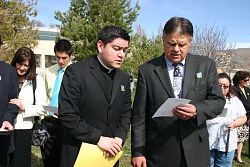Local religious leaders state their faith's positions on organ and tissue donations during seminar

SALT LAKE CITY — Religious leaders from the Catholic, Episcopal, Baptist, Jewish faiths and The Church of Jesus Christ of Latter-day Saints formed a panel to discuss their religion’s position on organ and tissue donations at the Salt Lake City Library April 1. "Many people are not sure if their religion supports organ and tissue donations and it’s a common concern when people are faced with the decision," said Tracy Schmidt, Intermountain Donor Services executive director. April is Donate Life month. Nationwide about 110,000 people are waiting for a life-saving transplant, said Alex McDonald, Intermountain Services director of public education. "We are here today to overcome some of the myths and misconceptions and answer questions people might have about donation." Each member of the panel expressed the views their religion has on organ donation. "The Catechism of the Catholic Church states ‘Donation of organs after death is a noble and meritorious act and is to be encouraged as a manifestation of generous solidarity,’" said Father Omar Ontiveros, pastor of Saints Peter and Paul Parish, the Catholic member of the panel. "It is not morally acceptable if the donor or those who legitimately speak for him have not given their explicit consent." "Pope Benedict XVI signed up as a donor when he was a cardinal," Fr. Ontiveros added. "In 2008, Pope Benedict said in a papal audience, ‘The act of love, which is expressed with the gift of one’s own vital organs, is a genuine testament of charity that knows how to look beyond death so that life always wins.’" Bishop Robert Parkinson, a first counselor in the LDS Stake Presidency in Rexburg, Idaho, said he received a liver transplant about a year ago. The LDS Church views the donation of organs and tissues as a selfless act. The decision to will or donate one’s own body organs or tissues should be made after receiving competent medical consultation and confirmation through prayer. "I know my donor’s family; they are my neighbors and I will always be grateful to them," said Parkinson. "I don’t know how you sufficiently thank someone for that gift. While the benefits to the recipient might seem obvious, the donor family has expressed, on several occasions, their benefits. His brother wrote me a letter stating, ‘Sadness was erased by the joy we were able to fill for you and your family.’" The Baptist religion has two basic beliefs concerning the ethical, moral and social issues surrounding organ donations, said retired Pastor Dr. Rodger Russell, now adjunct professor at Golden Gate Baptist Seminary. "We believe what the Bible says, and since the Bible doesn’t say anything, we go to the liberty of conscience for each individual," said Russell. "As a pastor, I’ve sat with families whose loved one has died, but whose organs were being kept alive. It gave them comfort to know that something good was coming from the death of the loved one. I believe most Baptists and most Evangelicals would view the donation of organs as good stewardship of what God has given us." Retired Rev. Diana Johnson, a volunteer at the Episcopal Diocese, said the Episcopal Church passed a resolution in 1982 that recognizes the life-giving benefits of organ, blood and tissue donation "as part of their ministry to others in the name of Christ who gave his life that we may have it in his fullness," she said. Rabbi Ilana Schwarzman, of Congregation Kol Ami, said the Jewish perspective on organ donation always involves the central text of the Torah. "You can’t give up one’s life to save another," Schwarzman said. "Traditionally for a Jew, death is when your heart stops beating. But I can confidently tell you the majority of Jews permit people to give organ and tissue donations because it is seen as improving the quality of life, which is seen as preserving life." Following the panel, the group walked to Utah’s Celebration of Life Monument in Library Square, where they prayed together to honor donors and recipients.
© Copyright 2024 The Diocese of Salt Lake City. All rights reserved.

Stay Connected With Us